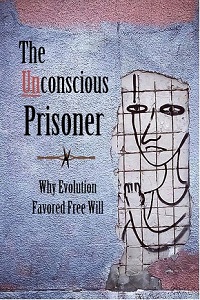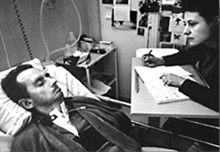|
TRANSLATE THIS ARTICLE
Integral World: Exploring Theories of Everything
An independent forum for a critical discussion of the integral philosophy of Ken Wilber
 David Christopher Lane, Ph.D.
Professor of Philosophy, Mt. San Antonio College Lecturer in Religious Studies, California State University, Long Beach Author of Exposing Cults: When the Skeptical Mind Confronts the Mystical (New York and London: Garland Publishers, 1994) and The Radhasoami Tradition: A Critical History of Guru Succession (New York and London: Garland Publishers, 1992). David Christopher Lane, Ph.D.
Professor of Philosophy, Mt. San Antonio College Lecturer in Religious Studies, California State University, Long Beach Author of Exposing Cults: When the Skeptical Mind Confronts the Mystical (New York and London: Garland Publishers, 1994) and The Radhasoami Tradition: A Critical History of Guru Succession (New York and London: Garland Publishers, 1992).THE PRISONER'S DILEMMAWhy Evolution Favors Free WillDavid Lane“Free will is to mind what chance is to matter.”—Charles Darwin
In this context, we are rather agnostic prisoners, never quite realizing our own entrapment.
Back in 1980 when I was attending the Graduate Theological Union in Berkeley, my childhood friend, Keith, and his delightful wife, Grace, came to visit me. We decided to take a boat to Alcatraz Island, home of the infamous prison which housed dangerous prisoners for over three decades (1934-1963). After shutting down formal operations, it had become a popular tourist destination for those visiting San Francisco. As we disembarked, our guide gave us a tour of the prison which was still in relatively good shape. Even the cells were kept clean and in working order. As I looked around at the compact buildings atop the small island, I realized why it was nearly impossible to escape. The San Francisco bay is not only extremely difficult to navigate (with ever changing winds and currents), but the water is always quite cold even during the summer months. The highlight of the trip is when we were asked to enter one of the cell blocks which was only 5 feet by 9 feet. It was stripped bare, except for a toilet, a small sink, and cramped sleeping cot. Right after we entered into the claustrophobic chamber, the tour guide then shut the bars and had us imagine what it would be like to be a prisoner sentenced for ten years and having to endure such a life. It was, I must admit, beyond creepy. Knowing that we weren't really prisoners, but only temporary visitors, made us actually enjoy the five minutes in the cell since we knew that we were always free to go. 
Forty years later, as I was lecturing about evolution to my honors Philosophy class at Mt. San Antonio College, one of my students asked an astute question about why humans tend to believe that they have free will, especially since almost everything that happens is out of our control. Her question for some odd reason jarred my memory and made me think of my brief sojourn to Alcatraz island. I then had one of those “aha” moments which helped me clarify my response to the query about free will and why evolution would have favored such a feature, even if it was on closer inspection an illusory one. Dovetailing with Plato's instructive, Allegory of the Cave, I made the following response to my student. What is it that the feeling of free will provides us? A sense of mobility, a sense of latitude, a sense of multiple options—in sum, a sense of freedom. But let's envision that we had no free will whatsoever and that every action that we performed was completely out of our control. Everything is predetermined by unconscious processes and our “I-ness” is merely the result of prior causes. Essentially, we have no freedom whatsoever, but are witnesses to a predetermined course of action. Our bodies and even our minds are constrained by forces beyond our control. More pointedly, we are captives bounded by a system which precedes and exceeds us in every direction. Further conceive that you realize this truth and know that there is no escape. How would you then feel? For most of us, I suspect, it would be a horrific realization, as if we suddenly became aware that we were prisoners in our own body. A terrifying example that may be applicable here is “Locked-in syndrome.” This a condition which is also known as “pseudocoma, . . in which a patient is aware but cannot move or communicate verbally due to complete paralysis of nearly all voluntary muscles in the body except for vertical eye movements and blinking.” Jean-Dominique Bauby is perhaps the most famous person to suffer LIS. His story is poignantly described in the French book, Le Scaphandre et le Papillon, later translated into English under the title The Diving Bell and the Butterfly. As Kar Yee Katherine explains, “Bauby's narrative of Locked-in Syndrome as told in his memoir allows us to glimpse into the loneliness and powerlessness he experienced as he lived in the deadened body on a day-to-day basis. Such an intimate account gives us several anthropological insights into long standing questions about the body and self, namely: 'how are you supposed to live, when your body can perceive but can no longer respond? How would people know inside the immobile body you are still alive?' Indeed, his unique experience invites us to reflect on the anthropological concepts and relations of the body, self and embodiment.” Being fully paralyzed after years of having bodily mobility can be overwhelming traumatic. The comparison between both lifestyles can be so jarring and so disruptive that it is little wonder that patients undergo severe depression and may contemplate suicide. How can one possibly survive such a tragic situation?  Jean-Dominique Bauby Jean-Dominique Bauby's narrative, so painstakingly related as it was by the blinking of his left eye, provides us with a clue. He oscillates between moments of great hope and great pain. What kept him going, besides the love and affection of his family, was his expectation that he would get better in the future. Even the slightest of improvements would make him supremely happy. As Bauby explains, “But for now, I would be the happiest man if I could just swallow the overflow of saliva endlessly flooding my mouth.” In an analogous way, every human being, every animal, every insect, and every living thing, is ultimately “locked in” to the body that defines it. But do we, like Jean-Dominique Bauby, realize our existential circumstance? Do we fully understand that our consciousness is restrained by an Alcatraz like prison cell? Most of the time, clearly not. The question that immediately raises its head is why not? There are, of course, many possible answers to this query, but I think one tantalizing answer is that free will is an evolutionary hack to provide organisms with complex forms of awareness an illusory feeling of flexibility, such that even if one's own navigation was premeditated by unseen powers the operating “I-ness” would believe (inaccurately, of course) that it was the commander and chief architect of almost all the choices that it made. Nature, in other words, has blinded us from truly seeing how enveloped we are by providing “a free will user interface” which allows us to believe that we have at our command a plethora of present and future options. We are unconscious internees, oblivious to our own captivity. A Zen-like riddle reveals in a nutshell evolution's ploy: “How do you keep a prisoner from escaping the ward? Make him or her convinced that they are not in a penitentiary.” This idea makes me wonder if someone like Jean-Dominique Bauby would feel different about his situation if he was born in a locked in condition and never knew otherwise? As one ancient poem articulated, “Free to fly are the thoughts of men, but flying itself is not free, bounded by a sky with a gravitational arc.” Yes, our imagination is truly a magnificent tool, allowing our minds an extraordinary elasticity. But that is precisely the hack, the idea that we are free is not freedom itself, but sustains us all the same to live on and not self-destruct or be overcome with hopelessness. For instance, if when visiting Alcatraz island, one was free to come and go as one pleases, then that very place would not seem like a prison at all and one would certainly not feel like a prisoner. In this context, we are rather agnostic prisoners, never quite realizing our own entrapment. But nature has jerry rigged our imprisonment (via our neurology) in such a way that we live as if we are free within our own cages, without knowing how encircled we really are.[1] As Lisa Zyga for Phys.org clearly elucidates, Consciousness has an evolutionary selective advantage: it provides us with the illusion of responsibility, which is beneficial for society, if not for individuals as well. In this sense, consciousness is our 'preview function' that comforts us into thinking that we are in control of what we will (or at least may) do ahead of time. As Cashmore notes, the irony is that the very existence of these "free will genes" is predicated on their ability to con us into believing in free will and responsibility. However, in reality, all behavioral decisions are nothing more than a reflection of our genetic and environmental history. NOTES[1] The ancient Gnostics, though widely disparaged by Christian orthodoxy during the second and third century CE, argued that the world was indeed a prison and we in our ignorance never realized it as such. They argued for a transcendent escape from the lower demiurges, who have ensnared souls by a series of false powers and attractions. [2] Lisa Zyga, "Free will is an illusion, biologist says", www.phys.org, March 3, 2010.
Comment Form is loading comments...
|